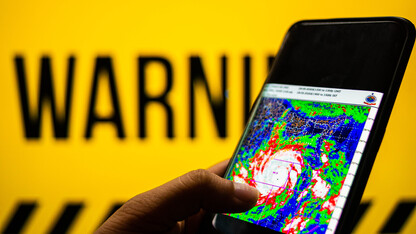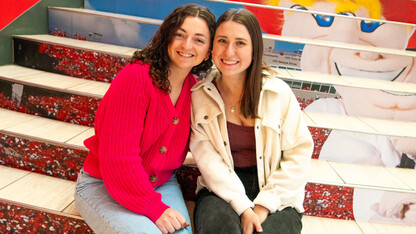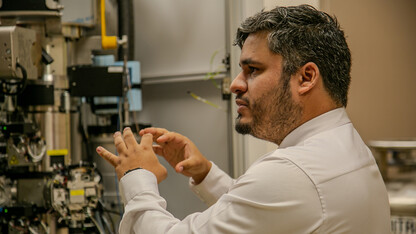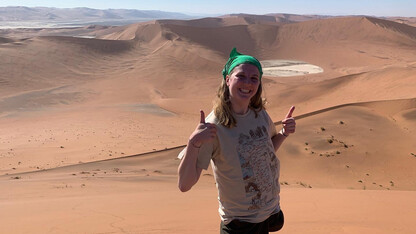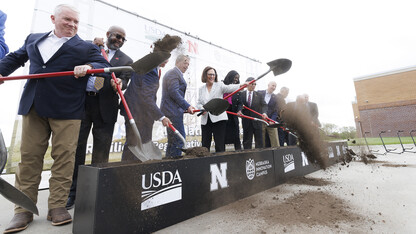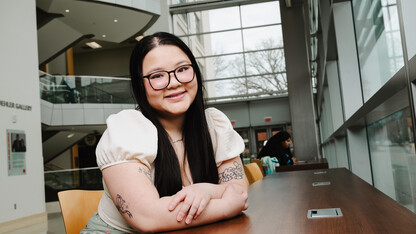· 4 min read
Humanities on the Edge begins fifth year, launches new projects

Humanities on the Edge, a premier lecture series for theoretical research in the humanities, has accomplished much more than its organizers expected in such a short time.
Now in its fifth year, Humanities on the Edge has become notable in scholarly circles and has launched two additional projects in theoretical and critical humanities research at UNL.
The series was launched in 2010, the work of two UNL English associate professors – Marco Abel and Roland Végső, who wanted to form an intellectual community on campus that crossed disciplinary lines.
“It came out of a need to create an intellectual community of similar interests in theoretical work that does not exist in any particular department,” Abel said. “It was an attempt to find a framework or activity to bring the people from the different departments together.”
The activity of interdisciplinary lectures by top scholars in cutting-edge theoretical humanities research areas was chosen and Humanities on the Edge: Cross-disciplinary Conversations began. Abel said the series has gained notoriety in scholarly circles and he has been regularly approached about the series at research conferences.
“We’ve been very successful,” Abel said. “I feel comfortable saying it’s helped put the university on the map.”
The series is more than just lectures: Végső, Abel and others have translated the concepts addressed by the series into their classes and presenters spend time in the classroom speaking with the students, giving students a chance to work with top scholars.
“It started with graduate classes, but we’ve been able to expand the pedagogical element to our undergraduates,” Végső said.
The concept also has lent itself to two additional projects: the Provocations book series being launched by University of Nebraska Press and a blog of critical theory run by graduate students of English, www.watershedblog.com.
This year’s series, “States of Exception,” will open Oct. 2 with a presentation by Ursula Heise of the University of California, Los Angeles, titled “BioCities: Urban Futures and the Reinvention of Nature.”
“States of Exception” is a borrowed term from Italian philosopher Giorgio Agamben, who argues that power concentrations increase in times of crisis and that as a society, we have been in a continued state of crisis and a time of growth in governmental power. Lectures in this year’s series will address this sense of crisis and how it is affecting the world. Heise’s talk will examine this concept from an environmental perspective and how humankind’s perception of its relationship with the environment has changed.
“If you think about this, the very idea of crisis implies that you are in an exceptional situation, not a normal situation. It has been argued that we are now, globally, entering a perpetual state of exception – that we are now living in a state of perpetual crisis and there are quite a number of unpleasant consequences of this,” Végső said.
“Agamben’s interest and our interests in this year’s series focus on politicians, in these crises, who say ‘here are these temporary measures.’ They call them temporary, but they are permanent. They’re not going away. For example, you can look at the war on terror, which is this very broad term, but it allows laws to be passed such as the Patriot Act, which means, of course, every single democratic citizen has the right to privacy, but since we are in the war on terror, it’s okay for the NSA to listen in on our phone conversations.”
The lectures are in the Sheldon Museum of Art, 12th and R streets, and are free and open to the public. This year’s schedule is:
– Oct. 2, 5:30 p.m.: Ursula Heise, professor, department of English/Institute of the Environment & Sustainability, UCLA, “BioCities: Urban Futures and the Reinvention of Nature”
– Nov. 6, 5:30 p.m.: Gregg Lambert, Dean’s Professor of the Humanities, Syracuse University, “To Have Done with the ‘State of Exception’”
– March 19, 2015, 5:30 p.m.: Adam Kotsko, assistant professor of humanities, Shimer College, “The Prince of This World: The Devil and Political Theology”
– April 2, 2015, 5:30 p.m.: Siva Vaidhyanathan, Robertson Professor in Media Studies, University of Virginia, “The Operating System of Your Life: How Tech Companies and Big Data Govern Your Identity, Knowledge, and Refrigerator”
– April 16, 2015, 5:30 p.m., Cristina Rodríguez, professor of law, Yale Law School, “Immigration Reform and the Political Value of Manufactured Crisis”



